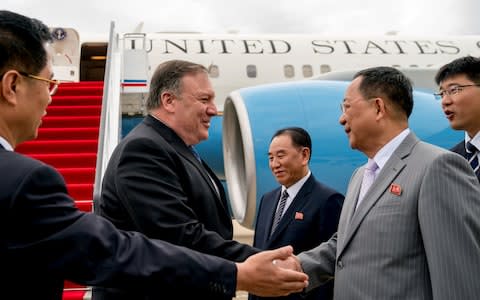North Korean top envoy expected in US, as South Korea no longer calls Pyongyang an 'enemy'

Kim Jong-un’s top negotiator is expected to travel to Washington this week in a potential sign that the momentum for a second summit between the North Korean leader and Donald Trump, the US president is building.
Kim Yong Chol, Pyongyang’s former spymaster, is likely to meet his US counterpart Mike Pompeo, the secretary of state, and possibly President Trump himself, reported CNN on Wednesday, although no firm details of meetings have been publicly announced.
“A lot of positive things are happening. He (President Trump) and Chairman Kim have established a good relationship, and conversations between the United States and North Korea continue,” a White House spokesperson told the news channel.
News of Mr Kim’s possible journey to the US had been reported earlier in the week by the South Korean press. According to the Yonhap newswire, he and two other North Korean officials have confirmed flights from Beijing to Washington on Thursday evening.
Mr Kim, one of Kim Jong-un’s most trusted advisers, also visited the White House last year, delivering an over-sized envelope with a letter from the North Korean leader less than two weeks before his first historic summit with Mr Trump in Singapore in June.

The top official had been due to meet with Mr Pompeo in the US in November but their plans were abruptly cancelled amid an ongoing standoff between Washington and Pyongyang over the progress of nuclear disarmament on the Korean peninsula.
Kim and Mr Trump agreed in Singapore in vague terms to move towards the complete denuclearisation of the peninsula but talks have since stalled over how to do so.
It is hoped that this week’s high-level delegation can forge a path to a second summit to break the impasse, and the date and location of the meeting are likely to be discussed.
It follows an exchange of letters between the two leaders earlier this month, where Mr Trump wrote that the US would consider Bangkok and Hanoi as possibilities.
The progress has been welcomed in Seoul, where Moon Jae-in, the South Korean president, has invested much political capital in pursuing peace with the North.
In a further sign of the diplomatic thaw that began last year between Pyongyang and Seoul, South Korea’s ministry of defence ditched its reference to the North’s government and military as an “enemy” in a white paper released on Tuesday.

The move has been viewed as part of ongoing efforts to build trust with the North, but it was not universally welcomed in the South, where some critics described it as a “betrayal of common sense” that endangered the nation.
The biennial paper no longer singles out North Korea as the largest threat to national security, and instead refers more broadly to the enemy as “any force threatening the nation’s sovereignty, territory and property.”
However, critics have pointed out that Kim’s regime remains highly unpredictable and has made no progress towards abolishing its nuclear weapons and ballistic missile capabilities.
Pyongyang also retains a standing army believed to be nearly one-million-strong, while there are suspicions that it has significant stockpiles of chemical and biological weapons.
Concerns remain that toning down the security stance might reduce the South’s battle readiness or could encourage the North to test Seoul’s military resolve.
“North Korea has not changed its declared ambition of taking over the entire Korean Peninsula and turning it into a communist state”, said Song Young-chae, a professor at Seoul’s Sangmyung University and an activist with the Worldwide Coalition to Stop Genocide in North Korea.
“To no longer identify the North as the biggest threat to this nation’s security is a betrayal of common sense”, he told The Telegraph.
“Since 1950, the Korean military has been the strongest deterrent to the North and those forces have sustained our nation”, he said. “A decision like this only serves to weaken us and strengthen the North”.
An editorial in the South’s JoongAng Daily echoed his fears, arguing that “The North’s massive military power - including its weapons of mass destruction, like nuclear and chemical weapons - still pose a serious threat to the security of our nation.
“It is time for our military to distinguish enemy from ally and prepare for a crisis on the Korean Peninsula rather than adhering to political interests at home”, it added.

 Yahoo News
Yahoo News 
